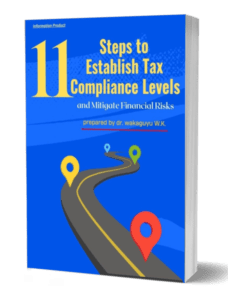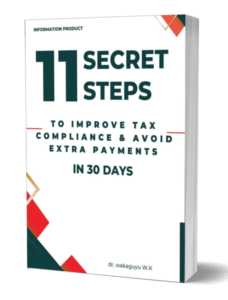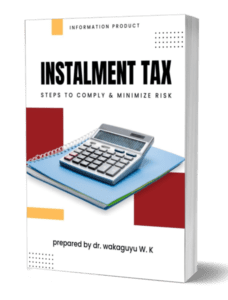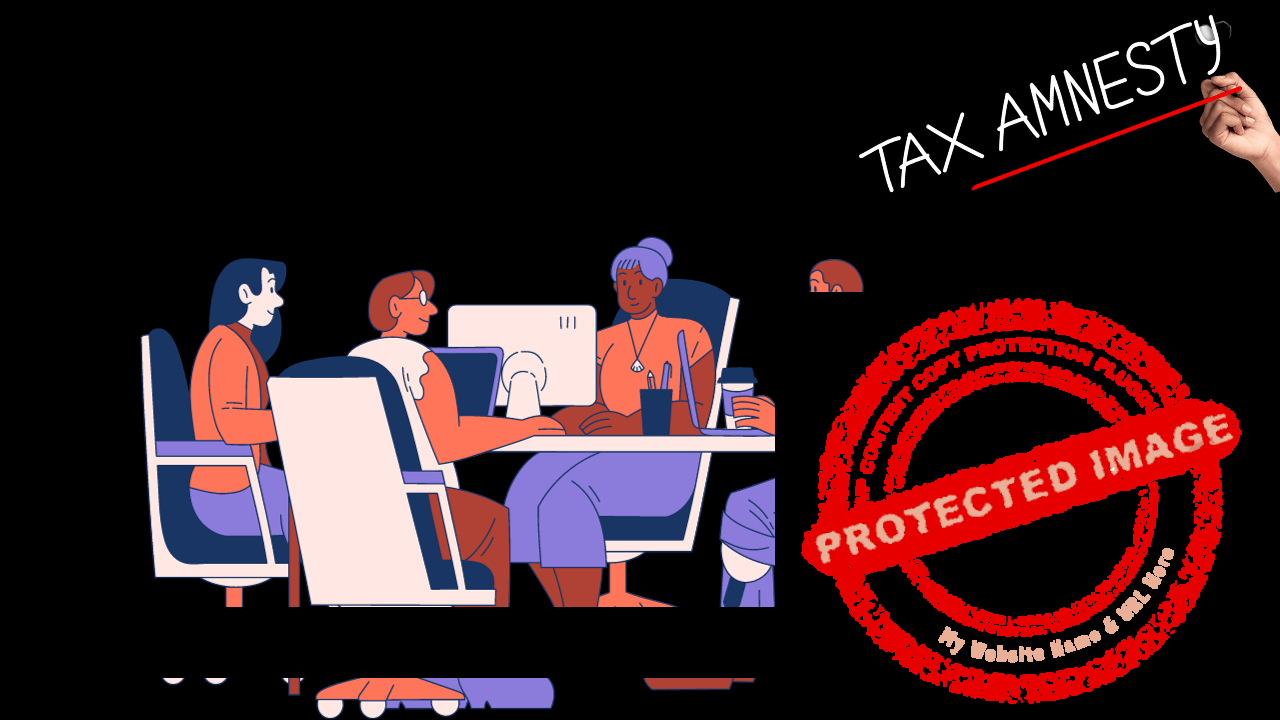The Kenya government announced a tax amnesty on penalties and interest in mid-2023. Many people were surprised by that move and wondered what it was all about. This was done through the Finance Act 2023, where Section 37E to the Tax Procedures Act 2015 was added to allow for past tax debts in interest and penalties to qualify automatically for amnesty.
a. Affiliate Disclosure: These are affiliate links from which we receive a commission at no cost. Read full Affiliate marketing disclosure HERE.
b. Tax Contents Disclaimer: The tax industry in Kenya is very dynamic. The tax contents in the posts are not professional advice. Read full disclosure HERE.
The current use of tax Amnesty means the Finance Act 2023 removed the section on the application of tax waiver and abandonment clauses from the various tax acts for the period of the amnesty. If you have any tax penalties and interest and can benefit from this tax amnesty, ACT immediately (hopefully). Do not be left behind.
It is rare that the government offers such amnesty.
Why the Tax Amnesty on Penalties and Interest?
It is a known fact that many taxpayers have hundreds of unpaid fines, penalties,, and interest. The governments may have implemented the tax amnesty initiatives for various reasons, given their potential benefits to taxpayers. Some reasons the government provided the tax amnesty for penalties and interest are:
1. Revenue Generation: The tax amnesty will help the government quickly raise significant money when the taxpayers pay the unpaid principal taxes. This will be beneficial, especially with the budget deficit.
2. Better Tax Compliance: The tax amnesty will entice taxpayers to come forward and settle unpaid taxes. In the future, there will probably be better tax compliance because of this gesture by the government.
3. Reduce Tax Evasion: Offering Amnesty could be a smart move to reduce tax evasion. Taxpayers with penalties and interest under Section 85 of the Tax Procedures Act, 2015, are not eligible for amnesty. The government hopes that this will be a tax evasion deterrent.
4. Clear Backlogs: There are backlogs from unresolved tax cases and disagreements. The Amnesty will help clear some of these cases by enticing taxpayers to come forward and find solutions to the problems.
5. Stimulate Economic Activity: By enabling taxpayers to use money that they would have otherwise paid in penalties and interest, amnesty may help boost economic activity in the country, thus spurring economic expansion and job creation.
6. Improve Taxpayer Relations: Offering amnesty may improve the relationship between the tax commissioner and taxpayers. This is a thoughtful gesture that will strengthen ties and inspire trust. Who does not want to be appreciated?
7. Simplify Tax Administration: The Amnesty initiatives will make resolving tax disputes and unpaid taxes more efficient, thus simplifying tax administration. For example, if a taxpayer has paid all the principal taxes, the amnesty will be granted automatically.
Why Should You Take Advantage of the Tax Amnesty on Penalties and Interest?
The tax Amnesty is here. What next? Taxpayers have various reasons to participate in tax Amnesty. The following are some of the reasons any taxpayer should consider when deciding whether to take advantage of the tax amnesty or not:
1. Reduced Tax Burden: As part of the tax Amnesty, the penalties and interest on paid taxes will be eliminated. By participating, the taxpayers will significantly lower their overall tax liability, making paying their tax debts manageable.
2. Avoid Legal Consequences: The tax law provides for criminal prosecution for failure to pay taxes. Penalties and interest are considered part of the taxes. Taking advantage of the tax amnesty will enable taxpayers to avoid these potentially severe legal consequences.
3. Improved Financial Standing: A taxpayer’s financial status will be improved by paying the principal taxes through amnesty. There will be savings from the unpaid penalties and interest.
4. Peace of Mind: The tax Amnesty may promote mental clarity by settling the pending tax issues, and there will be less stress. You will no longer fear any looming threat of increasing penalties, interest, or legal action related to unpaid taxes.
5. Enhanced Relationship with the tax-Commissioner: Participating in a tax amnesty scheme demonstrates a willingness to cooperate with tax-Commissioner and uphold the law. This will improve relations. Future interactions with tax-Commissioner may be simpler as a consequence.
6. Opportunity to Clean Tax Ledger: Tax amnesty allows taxpayers to clean the tax ledger of pending tax debts. This will allow taxpayers to start fresh and ensure compliance going forward.
7. Avoid Future Penalties and Interest: By paying off the principal tax arrears through Amnesty, you will avoid accruing additional penalties and interest on unpaid taxes. This will lower your compliance costs and make upcoming tax obligations less complicated.
Who is Eligible for Tax Amnesty?
Not all taxpayers are eligible for the tax amnesty. However, those taxpayers eligible for the Amnesty can be divided into four categories:
a. Taxpayers with Additional Taxes from Tax Audits but have Paid the Principal Taxes:
These are taxpayers who were previously audited by the tax-Commissioner, had additional taxes to pay but had already paid the principal taxes by 31st December 2022. However, they have penalties and interest due for the same paid principal taxes. This category of taxpayers has automatic tax amnesty and need not make any application.
b. Taxpayers with Additional Taxes from Tax Audits but have Unpaid Principal Taxes, Penalties and Interest:
These are taxpayers who were previously audited by the tax-Commissioner, had additional taxes to pay but had not paid the principal taxes, penalties and interest by 31st December 2022. This category of taxpayers will need to apply for Amnesty but must present a payment plan proposal for overdue principal taxes.
c. Taxpayers with Additional Taxes Under Self or Amended Assessments:
These are taxpayers with self-assessments or amended assessments for any period up to 31st December 2022, but the tax assessment is raised after 31st December 2022. The taxpayers will qualify if the principal taxes raised in the assessments are paid upfront or if they have a payment plan to pay before 30th June 2024.
d. Tax Liabilities Under Dispute:
These are taxpayers who have disputed the tax liabilities. The taxpayers also qualify for penalties and interest Amnesty. However, the penalties and interest will be on the principal taxes that the taxpayers conceded to pay.
Key Considerations for Tax Amnesty:
It is important to note that the Amnesty is based on:
a. The principal tax amounts:
i. Whether principal tax amounts have been paid.
ii. When principal tax amounts will be paid.
iii. How the principal tax amounts arose.
b. Principal tax payment:
i. Upfront payment for all the principal taxes by 30th June 2024.
ii. Proposal to pay all the principal taxes, but complete the payment by 30th June 2024.
c. Two dates:
i. 31st December 2022 – start date.
ii. 30th June 2024 – end date.
Lorem ipsum dolor sit amet, consectetur adipiscing elit. Ut elit tellus, luctus nec ullamcorper mattis, pulvinar dapibus leo.
Penalties and Interest Not Eligible for Tax Amnesty:
There are some penalties and interest not eligible for the tax amnesty. Penalties and interests from the following three sources do not qualify for tax amnesty:
a. Penalties and Interest from Tax Avoidance:
Taxpayers with penalties and interest in assessments resulting from acts considered tax avoidance under the tax Acts, as stipulated under Section 85 of the Tax Procedures Act, 2015, do not qualify for amnesty.
b. Tax Debts for Periods after 31st December 2022
All taxpayers with tax debt: principal tax, penalties and interest for tax periods after 31st December 2022 are not eligible for Amnesty.
c. Unpaid Principal Taxes After 30th June 2024
Any penalty and interest from unpaid principal taxes for the tax periods before 31st December 2022 will not qualify for Amnesty after 30th June 2024.
Effective Date of Tax Amnesty
The tax amnesty is not forever but is for 10 months. The amnesty period commenced on 1st September 2023 and is up to 30th June 2024. By the time you are reading this article, how many months are we in?
Tax Liabilities Covered By the Tax Amnesty
Waiver for penalties and interest is provided under the Tax Procedures Act, 2015. Hence, the Amnesty only applies to tax systems covered by the Act.
The taxes are:
- Income tax – Corporate, Pay As You Earn, Withholding income tax, Monthly rental income, etc.
- Value Added Tax, Withholding Value Added Tax.
- Domestic Excise Duty.
Monthly Tax Payments and Balance of Tax Due After 31st December 2022
The date is 31st December 2022 as the cut-off for amnesty qualification. What will happen to penalties and interest for taxes whose payment was legally due 31st December 2022?
This is what should happen:
a. For the year of income ending 31st December 2022, the balance of income tax was payable by 30th April 2023. Hence, the penalties and interest on the principal tax due for the year are eligible for Amnesty.
b. There were December 2022 taxes paid monthly, for example, VAT, Withholding Income tax, PAYE, etc., and payment due date is allowed on various specified dates in the following month. This means that any penalties and interest on these December 2022 monthly payments are eligible for the Amnesty.
Tax Amnesty Application Process - Steps
The steps to follow are different depending on the payment of the principal tax
a. Taxpayers who have paid the principal taxes but have not paid the penalties and interest for whatever reasons.
The following are the steps you will follow:
Step 1: Access i-Tax and check the debt status for all the tax types you are registered for.
Step 2: Select the tax type(s) and tax periods that you qualify for the Amnesty. The Amnesty should have been granted automatically.
Step 3: If the penalties and interest are still showing as owing, contact your TSO and look for your relationship manager. They should sort it.
b. Taxpayers with undisputed tax debts
These are taxpayers who acknowledge they owe the government tax, but for whatever reason, they have not paid the principal tax, penalties, and interest.
The following are the steps you will follow:
Step 1: Access i-Tax and re-check your debt status for all the tax types you are registered for.
Step 2: Pay the total principal tax or apply for an installment payment plan in the system-embedded payment plan agreement. The amnesty will be granted automatically if you pay the principal taxes.
Step 3: If you apply to make the principal tax payments on an instalment basis, start making the payments according to the payment plan.
Step 4: Complete the instalment payments before 30th June 2024. Penalties and interest for unpaid principal taxes beyond 30th June 2024 will not qualify for Amnesty.
Step 5: The Amnesty will be granted upon payment of the final installment according to the payment plan
c. Taxpayers with unresolved tax issues
These are taxpayers who have unresolved tax issues on i-Tax and are not in agreement with the total tax debts, but the issues are pending. They agree they owe the government tax, but because the issues are unresolved, they have not paid the principal tax, penalties, or interest.
The following are the steps you will follow:
Step 1: Visit your Tax Services Office (TSO), look for your relationship manager, and sort out the tax issues. The TSO will populate i-Tax with your correct tax liabilities – principal, penalties, and interest.
Step 2: Pay the total principal tax or apply for an installment payment plan in the system-embedded payment plan agreement. The Amnesty, will be granted automatically if you pay the principal taxes.
Step 3: If you apply to make the principal tax payments on an instalment basis, start making the payments according to the payment plan.
Step 4: Complete the instalment payments before 30th June 2024. Penalties and interest for unpaid principal taxes beyond 30th June 2024 will not qualify for Amnesty.
Step 5: The Amnesty will be granted upon payment of the final installment according to the payment plan.
d. Taxpayers with disputed tax liabilities
These are taxpayers who have objected to tax liabilities or have moved to either the Tax Appeals Tribunal, the High Court, or the Court of Appeal. All taxpayers are supposed to benefit from the amnesty. If there is any undisputed tax amounts and the taxpayers will make the payments, they qualify for the penalties and interest amnesty.
The following are the steps you will follow:
Step 1: Visit your TSO and agree on the amounts you acknowledge you owe. The TSO will populate i-Tax the tax liabilities: principal tax, penalties, and interest.
Step 2: Pay the total principal tax or apply for an installment payment plan in the system-embedded payment plan agreement. The amnesty will be granted automatically if you pay the principal taxes.
Step 3: If you apply to make the principal tax payments on an instalment basis, start making the payments according to the payment plan.
Step 4: Complete the instalment payments before 30th June 2024. Penalties and interest for unpaid principal taxes beyond 30th June 2024 will not qualify for Amnesty.
Step 5: Once you complete making the final instalment tax payments, the Amnesty will be granted automatically.
Lorem ipsum dolor sit amet, consectetur adipiscing elit. Ut elit tellus, luctus nec ullamcorper mattis, pulvinar dapibus leo.
Payment Plan Conditions
1. The payment plan is for the total principal taxes payable for all tax obligations.
2. The instalments should be equal for all the months.
3. You can spread the instalments for the remaining month up to before 30th June 2024.
4. On application, the first instalment should be paid.
5. If you default the payment plan, KRA may enforce the total payment. hence if you cannot make payment for any month, do not wait, get in touch with KRA asap.
6. You must agree to the terms and conditions for the payment plan.
Way forward for Tax Amnesty:
The way forward depends on the liabilities you have:
1. If you have paid all the principal taxes but have penalties and interest to pay, access i-tax, check the penalties and interest in your tax ledger and apply for tax amnesty.
2. If you have undisputed principal taxes, penalties and interest to get money to pay the principal taxes or apply to pay on installment basis.
3. On application, the first instalment should be paid.
4. If you default on the payment plan, the KRA may enforce the total payment. Hence, if you cannot make payment for any month, do not wait, get in touch with KRA asap.
5. You must agree to the terms and conditions for the payment plan.
Note:
1. The applicable tax laws are not suspended but shall prevail if the information provided by the taxpayer is found to be inconsistent.
2. After the amnesty, you will get a certificate clearing you of the tax obligations.
Our call:
Consult i-Tax and check if you have any penalties and interest to pay. In case there are issues to sort out, visit your TSO. Do not wait, complete the process early.
Thank you for reading the article.
dr. wakaguyu W.K
Note:
For Tax laws and regulations, get into the habit of checking KRA Website.
Meanwhile ...







